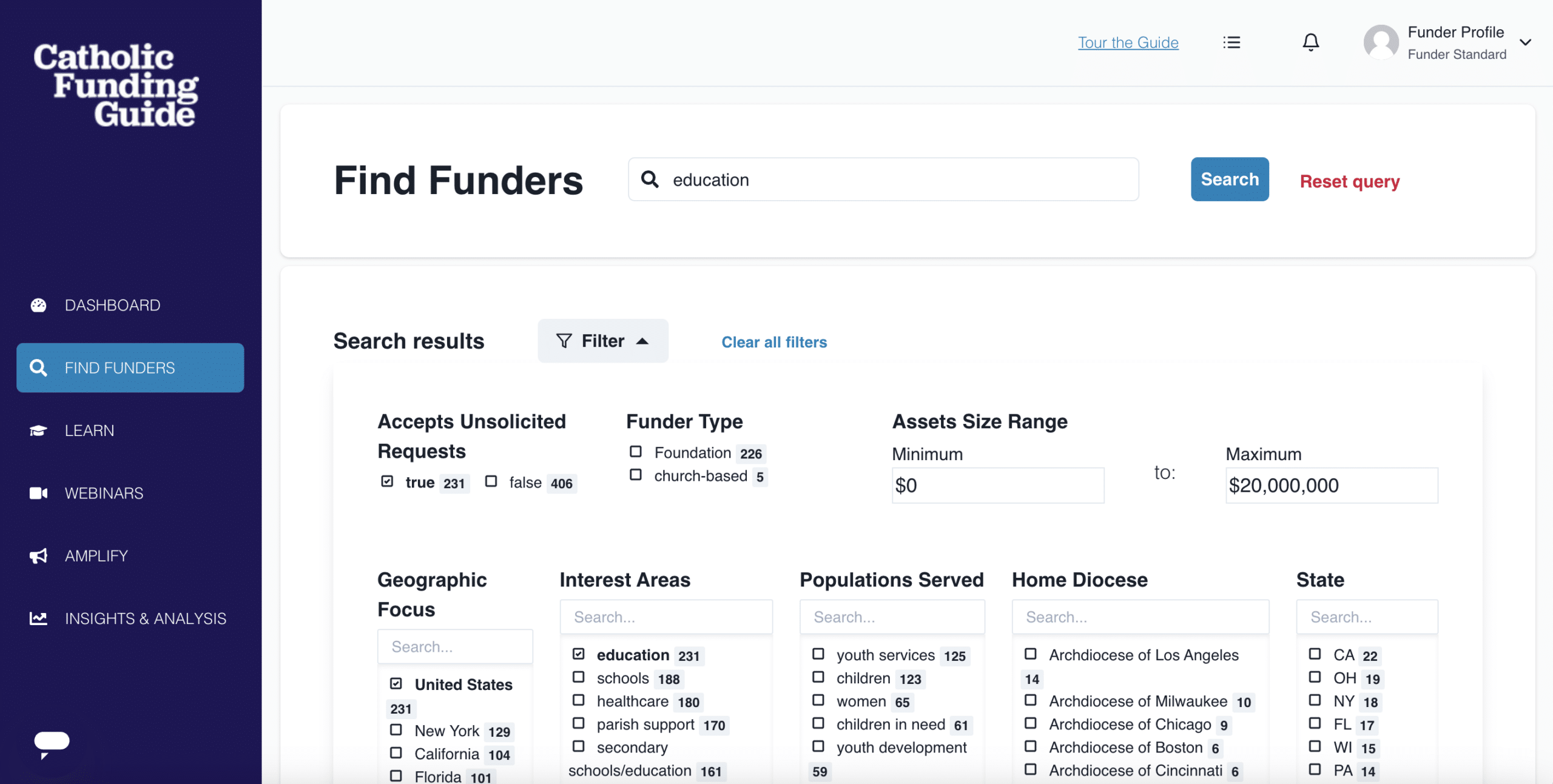Donors today are far more reflective as they make their giving decisions. An era in which reliable support came largely through the brand loyalty of Catholicism alone, has now given way to a more competitive and results-oriented environment. Donors tend to ask more candid questions about internal operations, governance, and leadership than in previous times.
Charities must be more accountable and open and have well-thought-out programs consistent with their mission. They have to have oversight structures that are accountable and free of conflicts of interest. They must have good record-keeping and independently verified financial information. Programs not only have to address important needs but be commensurate with the applicant organization’s capacity and talent.
Key Components of Grant Proposals
Grant proposals today should reflect a clearly stated purpose and show how the proposal is compatible with a particular foundation’s mission. Proposals should contain:
- A mission statement, a history of the organization and how it is governed
- An articulation of the need and communities served; the specific amount of the funds requested
- Relevant information on other donors who have been approached or are involved in the project
- How the project will be sustained over the long run
- The expected outcomes and how they will be measured
- Financial information on the applicant institution including the latest audit if available
- The proposed budget for the project
- Background information on the principal staff and board members.
Research and Planning
To put together a winning proposal and direct it to the appropriate funding agency requires good research and careful planning. Happily, many resources are online.
The Catholic Funding Guide contains detailed information on grantmakers, including the most pertinent information found on a grantmaker’s 990 form: grants given and board members. The Guide also provides a summary of previous grants made, funding areas of support, application process, and deadlines.
Open 990 provides free information about the operations and finances of nonprofit organizations including foundations. The federal annual tax returns, (often referred to as 990s) of the nation’s one million charities are accessible through this service.
The Foundation Center is a reference library that provides comprehensive information on most U.S. based foundations. Its mission is to support and improve institutional philanthropy by promoting public understanding of the field and providing help to grant seekers. The Center also offers a subscription service that enables its users to do advanced grant research online.
The Center on Philanthropy at Indiana University offers very useful research and internet links to philanthropic organizations and nonprofit operating standards as well as educational opportunities for those who wish to learn more about the discipline of fundraising.
Other internet resources include the Better Business Bureau Wise Giving Alliance. Its standards are often used by donors, foundations and businesses to judge the quality and effectiveness of a grant seeking organization.
The Standards for Excellence Institute is a membership organization providing training and certification in nonprofit management in accordance with carefully developed standards based on best practices of not-for-profit organizations.
Other professional fundraising associations that can keep the grant seeker in touch with fundraising standards that are influential in the donor community include the Charity Navigator; the National Council of Nonprofit Associations; the Alliance for Nonprofit Management; the Association of Fundraising Professionals; the Catholic Development Council and the International Catholic Stewardship Council.
Relationship Building
Catholic philanthropists are more active than ever and tend to fund those institutions that they know personally. That is why fundraising must be looked upon as relationship building. Good development work will seek to build excellent communications with funders inviting them and enabling them to participate in a cooperative partnership to achieve a worthy purpose. Grantees will find that religious donors have much more to offer than their material generosity. Their advice, experience, network of friends and family can also be welcomed gifts that enhance the overall program direction. Excellent fundraising will see an initial grant as an opportunity to engage donors in ongoing conversation and interaction.
Types of Funds and Funders
Foundations and other grantmaking organizations make different kinds of grants. Some are general support grants for the operations of the organization. The vast majority of grants are project specific. Funds awarded for these activities are restricted for these projects only.
A few foundations make emergency grants to allow an organization to respond to an immediate crisis as in the event of an earthquake, hurricane, or pandemic for example.
Some foundations offer seed money to launch an initiative, and they expect to see many other donors participating in bringing the project to life.
Capital grants usually finance the construction or repair of a building or underwrite the purchase of land.
A few foundations provide grants for endowments—usually undertaken to provide long range stability for the institution.
Greater use is being made of challenge grants where the grantee may be required to match specified dollar amounts with donations from others.
A number of foundations make program-related investments enabling an applicant organization to obtain low interest loans and loan guarantees especially important, for example, for anti-poverty projects like housing and micro-enterprise development.
It is good to keep in mind that almost no grantmakers provide funding for deficit financing or after the particular event or activity has been completed.
Application Procedures
While application requirements vary from grantmaker to grantmaker, usually a preliminary inquiry is made by letter by the grant seeker. Since many foundations restrict their giving to pre-selected organizations, verifying this will save time and frustration. Checking the foundation’s profile in the Catholic Funding Guide or Federal 990 tax form will show if indeed the foundation does entertain applications for assistance. Once an applicant has been invited to do so, a fuller application is then made. Some foundations have their own application form, but many do not.
Basic applications often require the following elements:
- Cover letter describing the project and why the particular agency contacted seems to be an appropriate funder
- Detailed budget for the project, the problem or need being addressed, and the intended outcome
- How and when the organization will go about it
- Background on the key individuals involved.
Basic information on the applicant organization includes such items as a brief history, mission, key staff, board members and the organization’s financial situation. Many grantmakers require a copy of the latest audit by an independent accountant as well as a copy of the IRS Determination Letter confirming the organization’s nonprofit status as a 501(c)(3) entity. It is always a good idea to tell the funder of pending applications before other donor agencies, as well as any grants received to date. Some foundations require a letter from the bishop or religious superior.
You can expect a foundation’s trustees will ask questions like these before making a decision:
- Does the need addressed in the grant relate to its grantmaking history?
- Is the geographical location of the applicant within the foundation’s scope of interest?
- Does the amount of money requested fit within the grant range of the foundation?
- Is the type of support – e.g. endowment, capital – within the guidelines of the foundation?
- Is the grant request respectful of the foundation’s deadlines?
- Is the application complete?
- Is the requesting organization – e.g. a school or parish – the kind of entity that falls within the foundation’s grant history?
These and other questions necessitate that grant seekers do as much research as possible to find the appropriate source of help.
Accountability to Donors
One last but important piece of advice. Good development work involves excellent communication and a sense of accountability. In justice, a donor’s intentions must be honored scrupulously. Donors should be kept informed on a regular basis on the use of their grants. Many foundations are utilizing formal grant agreements which often require a written report of the grant expenditures.
Philanthropy welcomes the religious grant seeker who is willing to help the Catholic community carry out its important mission. Forming a partnership with grantmakers requires thoughtful research, care, and a strong sense of stewardship. Those who are prepared to invest a modest amount of time in using this Guide will find that their development task has been made considerably lighter.



